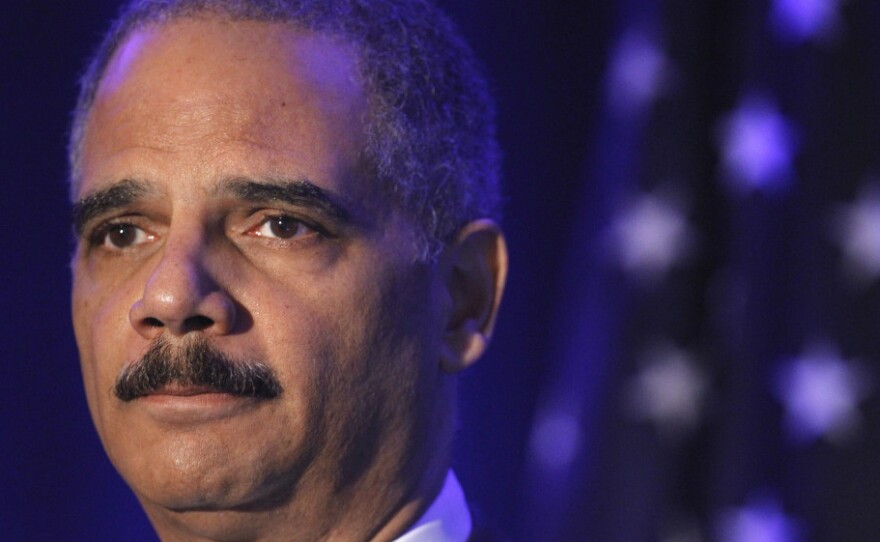The daring U.S. military raid that killed Osama bin Laden may have closed a chapter in America's long fight against terrorism, but as with many other national security issues that Eric Holder has faced in two years as attorney general, there's no end to the complications, even in a time of good news.
The Justice Department barely took time to reflect on the death of the country's most wanted terrorist. Holder reminded his staff this week that they need to be on guard against new attacks by al-Qaida. On Capitol Hill on Tuesday, he fielded questions about the role of torture in intelligence breakthroughs that located bin Laden.
"There was a mosaic of sources that led to the identification of people who led to," Holder began — but California Republican Dan Lungren quickly interrupted.
"I understand that, but were any pieces of that mosaic as the result of enhanced interrogation techniques?" Lungren asked.
"I do not know," Holder replied.
Republicans have been pressing the Obama administration about whether terrorism suspects had disclosed key clues about bin Laden's messenger networks after being subject to techniques including waterboarding and sleep deprivation.
That question still matters — and not just for history. A special prosecutor, John Durham, is looking into whether any U.S. contractors can be charged with a crime for going out of bounds in their interrogations of detainees.
In an extended interview with NPR, Holder said he's been getting regular updates from Durham.
"He's made substantial progress, and I'm pretty confident that we will have a decision from him in the not too distant future," Holder said.
That word can't come soon enough for the intelligence community, which has been spooked by the idea of a criminal prosecutor poking around in the shadows of its work.
Ben Wizner of the American Civil Liberties Union said in an interview that he's waiting for that decision, too.
"We need something that can help us reach some national consensus on whether these methods were appropriate, whether they were legal or whether they helped the country or not," Wizner said.
This is hardly the attorney general's first searing experience with the politics of national security. It's been a month since Holder announced that the trial of Khalid Sheikh Mohammed, an accused mastermind of the Sept. 11 attacks, would take place in a military courtroom at Guantanamo Bay, and not Holder's preferred location, the federal courts in New York, the scene of that crime almost a decade ago.
"I'm almost reluctant to say I lost as much as I got overruled, I got blocked," Holder said. "But I think I did the right thing. I think I made the right decision."
My hope always has been to stay here as long as the job is enjoyable and as long as I think I can make a contribution and there are still a whole host of things in the national security sphere that I want to try to shape.
Holder said he believes the facts and the legal issues surrounding the Sept. 11 case made it right for the regular federal court system, which has handled hundreds of terrorism cases in the past.
In Holder's mind, Congress is to blame for its "inappropriate" move to block the Justice Department from using federal money to transfer detainees to the U.S. for a trial.
Dismissing Criticism
Rep. Peter King (R-NY) told the WOR radio network in an interview last month that he sees it another way.
"Whether or not Eric Holder saw it, the political people in the White House saw that there was a revolt going on here in this country," King said on the Steve Malzberg show. "People did not want those trials down there."
King said that he thinks Holder is out of touch.
"If he feels that strongly about it then it's his moral obligation to resign," King said.
Holder dismissed that criticism. He said he never considered resigning in protest over the location of those trials. He has told friends he feels energized and he wants to stay through President Obama's first term in office.
"I'm certainly not going to serve two terms," Holder said, referring to his Clinton-era predecessor as attorney general. "You know, Janet Reno did that and how she did that is amazing to me."
He continued: "My hope always has been to stay here as long as the job is enjoyable and as long as I think I can make a contribution and there are still a whole host of things in the national security sphere that I want to try to shape."
Top Priority: Terrorism
First among them: the choice of a new FBI director when Robert Mueller's 10-year term expires this fall. Holder said the White House needs to get a nominee to the Senate later this month or by early June. That appointment will be a legacy issue for the Obama administration.
The administration wants a candidate "who understands what a 21st century FBI looks like," Holder said, balancing intelligence gathering, civil liberties and law enforcement demands.
Terrorism, both domestic and international, remains the single-biggest priority for the Justice Department.
The attorney general says he spends 65 percent or 70 percent of his time on national security. He gets daily briefings at 8:30 a.m., and he said some of the threats come from places that might surprise people.
"Those who are involved in domestic terror groups, racists, people who have animus against people of certain religions, they are a constant threat as well," Holder said.
He didn't talk in detail about the arrest last month of a man in Washington state who allegedly planted a deadly bomb along the Martin Luther King Jr. Day parade route earlier this year. Workers found the bomb in a backpack before it had detonated.
Department Criticized
Holder addressed in general terms another big national security case. He said he "deplored" the release of sensitive information by the WikiLeaks website. A federal grand jury in Alexandria, Va., is investigating those disclosures, and prosecutors are apparently looking for signs of a conspiracy between the website's founder, Julian Assange, accused leaker Pfc. Bradley Manning and others.
There haven't been major terrorist attacks on Holder's watch. But as the country approaches the 10th anniversary of the Sept. 11 attacks, Wizner of the ACLU said he expected more from this administration.
"I think for better or worse, largely for worse, our political and legal discourse is still dominated by the fear of terrorism and the idea that this country is in a state of perpetual emergency," said Wizner, director of litigation for the ACLU's National Security Project.
Wizner isn't pointing the finger at Holder. He said there's something else going on.
"The department has not been independent in the way that the Justice Department ought to be, but too often has been carrying out the political, not the legal objectives of the White House," he said.
That dynamic didn't just influence the fight to close the Guantanamo Bay prison, Wizner said, but also the department's defense of the intelligence community in lawsuits over rendition and wiretapping.
'An Inherent Tension' With White House
For his part, Holder said he's had his share of disagreements with the White House and his counterparts across the Cabinet.
One of the most controversial decisions of his first two years was expanding the mandate of prosecutor Durham, to explore whether any U.S. interrogators had gone beyond the bounds of the law in their treatment of terrorism suspects. The move prompted substantial outcry from the CIA and former Bush administration officials.
"There's a tension ... almost an inherent tension between the Justice Department and the White House, and I think that's actually a good thing," Holder said.
At the same time, Holder said he is part of a larger national security team that the president leads. Holder is not the lone voice.
As for his ill-fated decision to try the architects of the Sept. 11 plot in New York, Holder said he is still proud of that choice he announced 18 months ago. These days, he is speaking to history.
"I'm comfortable with it not only for the way it looked in November of 2009 but how it will look 50 years from now," he said.
Copyright 2023 NPR. To see more, visit https://www.npr.org. 9(MDAzMjM2NDYzMDEyMzc1Njk5NjAxNzY3OQ001))







